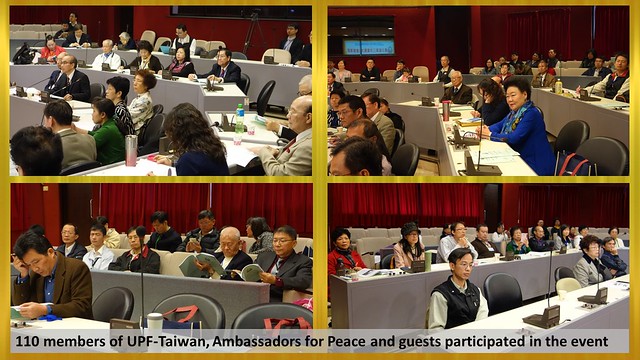Taipei, Taiwan—UPF-Taiwan held its annual General Assembly and celebration of UN International Women’s Day at National Taiwan Normal University in Taipei on March 5, 2016. Among the more than 100 attendees were members of UPF-Taiwan, Ambassadors for Peace and guests.
During the first half of the event, a report was given on UPF-Taiwan’s activities in 2015 as well as on the chapter’s annual balance sheet.
The second half of the event was the International Women’s Day celebration. Dr. Joanne J.L. Chang, research fellow of the Institute of European and American Studies at Academia Sinica in Taiwan, gave a 30 minute speech on the topic, “From the Rise of the Women Leadership Worldwide: Discourse on the Role of Women in the Development of Peace Building.”
Throughout human history, most decisions about war and how to solve wars were made by men. However, if women participated in decision-making and negotiation, the situation in the world might be different. Dr. Chang spoke about how 2011 Nobel Peace Laureate Leymah Gbowee, who is a Liberian peace activist, social worker and women's rights advocate “brought together Christian and Muslim women to play a pivotal role in ending Liberia's devastating, fourteen-year civil war in 2003. This historic achievement paved the way for the election of Africa's first female head of state, Liberian President Ellen Johnson Sirleaf. It also marked the vanguard of a new wave of women emerging worldwide as essential and uniquely effective participants in brokering lasting peace and security.”1 Today, there are more than 20 women heads of state worldwide. In Taiwan, 37% of the total number of legislators are women.
Dr. Chang also explained the concept of peace based on Henry Kissinger’s view on peace. She said, “Persuaded that peace could not be made the objective of foreign policy, Kissinger argued that it was the bonus that followed from a properly conceived and intelligently executed policy.” She further noted that if the strength of two parties is disproportionate, it can only produce massive instability and insecurity, such as what had happened after the Vietnam War. The Paris Peace Accords that were signed by the governments of the United States, North Vietnam and South Vietnam in 1973 to establish peace in Vietnam and bring an end to the Vietnam War only lasted for two years. In 1975, North Vietnam took over South Vietnam.
During the Q&A session, Dr. Chang answered questions related to the newly-elected President of Taiwan, Mrs. Tsai Ing-wen, who is the first Chinese woman president, including on the president’s policy on Cross-Strait relations. She emphasized that every Taiwanese politician needs to understand the seriousness and the consequences for peace in the Cross-Strait relationship. Using oxygen as a metaphor for peace, Dr. Chang said that only when there is no more oxygen would we realize that it is what we breathe to keep us alive. Similarly, peace is like oxygen; people across both straits should always value and remember the peace mainland China and Taiwan have achieved so far.

